
Working in an office environment full of cubicles can be both an opportunity and a challenge.
Observing work etiquette in the cubicle space is not only a sign of professionalism but also has a direct impact on the peace of mind, focus, and efficiency of the entire team.
But the question is, what is cubicle etiquette exactly?
Cubicle etiquette refers to the unwritten rules for working respectfully in shared office cubicles—such as keeping noise low, respecting privacy, avoiding strong smells, keeping spaces tidy, limiting personal calls, and being mindful of interruptions.
In recent years, with changing work patterns such as hybrid offices and shared spaces, this issue has become more important than ever.
Nowadays, it is no longer enough to just be quiet or have a tidy desk; instead, respecting privacy, managing digital communications, and even paying attention to mental health are part of the unwritten rules of working in the office cubicle.
In this comprehensive guide, we explore everything about cubicle etiquette in 2026, from the rules to the new challenges that arise in the modern workplace.
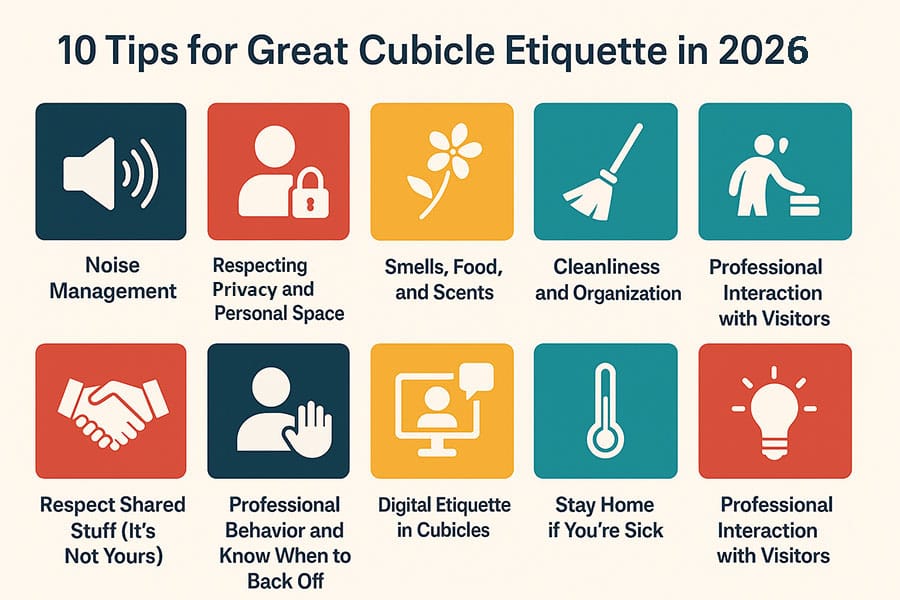
You Might Also Enjoy: Top 10 Brands for Soundproof Modular Office Cubicles [2026]
Why Cubicle Etiquette Still Matters in 2026
Despite major changes in working practices such as remote working, hybrid offices, and shared spaces, employees still spend a large portion of their time in private office cubicle environments.
This may seem simple at first glance, but observing or not observing etiquette in this space can have a profound impact on individual productivity and work relationships.
- Impact on productivity, collaboration, and workplace harmony: When employees respect unwritten rules, a calm and predictable environment is created.
This increases focus and reduces errors.
Cubicle etiquette also makes work interactions more respectful and effective.
On the other hand, it prevents tensions and small conflicts that can weaken team morale.
- Stats on office distractions: According to recent research, employees in both open and cubicle environments experience distractions on average every 3 to 8 minutes.
The most common distractions include noise, constant interruptions, and odors such as spicy foods, perfumes, or strong sprays that become bothersome in a closed space.
These factors not only affect individual focus but can also throw the entire team off track.
- HR perspective: From the perspective of the human resources department, work etiquette in the cubicles is considered part of organizational culture.
Adhering to these principles is a sign of respect for colleagues and the company’s values.
It also plays an important role in creating a healthy, happy, and professional environment.
The Golden Rules of Cubicle Etiquette
1. Noise Management
This one’s huge. You might not even realize it, but small noises can quickly drive your coworkers up the wall.
Typing too loudly? Clicking your pen nonstop? Playing videos on speakerphone?
Yep, all of those things can be super distracting.
If you need to listen to music, use headphones.
There’s nothing wrong with listening to music or videos at work, but headphones should always be used so that the sound doesn’t disturb those around you.
Even with headphones, the volume needs to be at a level that does not cause sound leakage that disturbs others.
Talking on the phone or video calling is an inevitable part of daily work, but it should be done in a gentle tone and appropriate volume.
If you’re on a call, try to keep it short—or better yet, take it to a quieter spot if possible.
And hey, if you’re naturally a loud talker (we all know someone who is), it might be worth dialing it back just a bit. Your coworkers will thank you!
Quiet Zones must be respected.
Many organizations designate a part of the office as a noise-free space so employees can do work that requires deep concentration.
Overall, noise management in the cubicle space is an individual skill that has a direct impact on the quality of teamwork.
2. Respecting Privacy and Personal Space
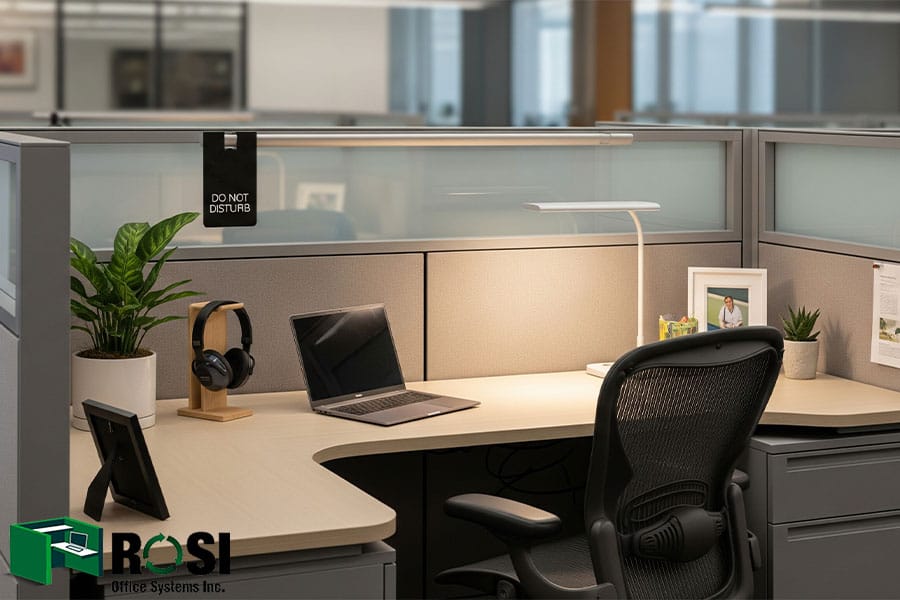
You Might Also Enjoy: Top 10 Key Features to Look for in Office Cubicles
One of the most important principles of work etiquette in the modern office cubicle is respecting the privacy and personal space of colleagues.
Although cubicles do not have high walls like independent rooms, they are still a personal and work boundary.
Crossing this boundary without permission can cause discomfort or even reduce trust between colleagues.
Just because someone’s in a cubicle doesn’t mean they’re always available for a chat. Before stepping into someone’s space, pause.
Do they look busy? Are they wearing headphones? If the answer to either is “yes,” maybe hold off for a bit.
If you need to get their attention, try knocking lightly on the wall or just giving a polite “Hey, got a second?” Respecting boundaries goes a long way.
This simple act shows that you value their time and attention.
Also, avoid hovering. Nobody likes the feeling of someone standing over their shoulder, watching them type. Trust me—it’s awkward for everyone involved.
This simple act shows that you value their time and attention.
The second tip is to avoid looking at your colleagues’ screens or documents.
Many people work on sensitive projects or confidential information, and even if the subject matter is not confidential, peeking at the screen or standing behind them can feel uncomfortable.
It’s best to maintain a respectful distance and wait for your colleague to show you the page or document in question.
3. Smells, Food, and Scents
The cubicle space is heavily affected by odors due to its relative confinement and the close proximity of employees to each other.
Look, everyone loves lunch. But not everyone loves your lunch. Bringing fish or anything with a strong smell to the office is a risky move.
If you have to eat such foods, it is best to eat in the company dining hall or kitchen, not in your personal cabin.
What is pleasant for one person may be annoying for another and may even affect their concentration or health.
For this reason, following simple principles regarding food, perfume, and air fresheners is an important part of cubicle etiquette.
Excessive use of cologne, sprays, or even table air fresheners may be problematic for others, especially those with sensitivities or allergies.
It’s best to use mild perfumes and avoid spraying them at work.
The goal of cubicle etiquette is to ensure that everyone can maintain their focus without feeling harassed or distracted.
Keeping your workspace clean, taking out food waste at the right time, and avoiding strong odors all help create a calm and professional work environment.
4. Cleanliness and Organization
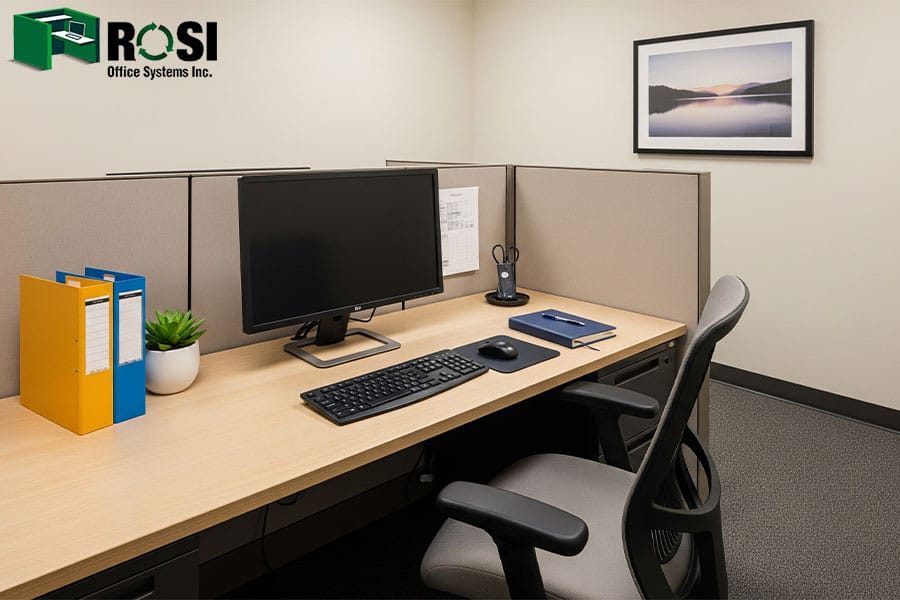
You Might Also Enjoy: Top 10 Effective Ideas to Make Cubicles More Private in 2026
Due to the limited space, cubicles can quickly become cluttered, so following simple rules of organization and cleanliness can make a big difference in your and your colleagues’ work experience.
The first tip is to keep your personal desk tidy.
Let’s be honest: A cluttered cubicle doesn’t just make you look disorganized—it can actually stress out the people around you.
No one wants to sit next to someone whose office desk looks like a tornado just hit it.
Observing waste etiquette is also very important.
Leaving food waste or stacking disposable paper in the cubicle can quickly create an unpleasant odor or unprofessional appearance in the workplace.
Take a few minutes at the end of each day to tidy up.
Toss out that coffee cup you’ve been hoarding. Organize your papers.
Wipe down your desk if it’s gotten a little grimy (it happens).
Not only will it help you stay productive, but it’ll also create a more pleasant vibe for everyone nearby.
5. Professional Behavior and Know When to Back Off
The cubicle space is a place where the boundary between personal life and work interaction is constantly exposed to the eyes of others.
For this reason, the way each person behaves can greatly impact their professional image as well as the overall atmosphere of the environment.
One of the most important tips is to avoid gossiping and noisy conversations.
Informal conversations or gossip about colleagues not only damage a person’s reputation but also turn the workplace into an environment full of stress and distrust.
Since all movements are more visible in cabin environments, behaviors such as squinting, crossing your arms, or appearing impatient can convey negative messages to those around you.
Conversely, a simple smile, respectful eye contact, and an open, friendly body posture can foster trust and cooperation.
It’s great to be approachable and friendly, but not everyone wants to have long conversations while they’re trying to meet a deadline.
Read the room. If someone’s responses are short or they’re glued to their computer, it’s probably not the best time to chat.
That being said, don’t be a total recluse either.
A quick “Good morning” or “Have a great weekend” goes a long way toward building good relationships.
In today’s workplaces, which are a mix of people from diverse backgrounds, communication norms, types of jokes, and even greeting styles may differ.
Paying attention to these differences and avoiding judgment or behavior that might be considered offensive to someone is a sign of professional maturity and mutual respect.
6. Respect Shared Stuff (It’s Not Yours)
Office supplies aren’t free-for-all.
If you borrow a stapler, tape dispenser, or anything else that doesn’t belong to you, put it back.
And if you finish off the last of the printer paper or notice the coffee machine is out of filters, don’t just walk away.
Restock it—or at least let someone know.
Shared spaces (like breakrooms) need extra attention, too.
Clean up after yourself, whether it’s your lunch crumbs or that weird soup smell you accidentally left behind in the microwave. It’s all about being considerate.
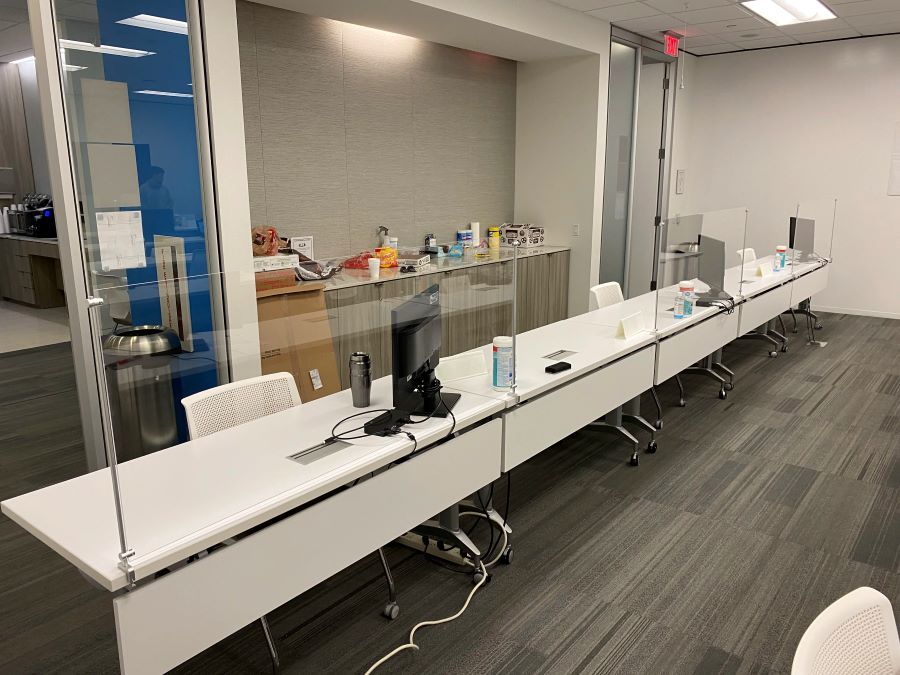
You Might Also Enjoy: Collaborative Cubicles: The Office Furniture Trend for 2026
7. Digital Etiquette in Cubicles
In recent years, digital devices have become an integral part of the workplace, and their proper management in the cubicle space has become particularly important.
Following digital etiquette not only helps improve productivity but also prevents colleagues from being inconvenienced or misunderstood.
The first point of digital cubicle etiquette is the tone of your emails and chat messages.
Digital communication should always be professional, respectful, yet concise and clear.
The second issue is the placement of headphones and cameras in outdoor video calls.
When making a video or voice call, use headphones so that your voice does not disturb others, and position the camera in a way that preserves your privacy and the space around you.
The third point is to control AI assistants and notifications.
Automated messages, mobile alerts, or notification sounds can be distracting.
It’s a good idea to set all of these notifications to silent or “do not disturb” mode while in the cubicle so that your digital environment doesn’t disturb others.
Also, Be Aware of Visual Distractions.
Believe it or not, what’s on your computer screen can be distracting, too.
Bright, flashing images? Loud videos? Probably not ideal when your coworker is trying to focus.
8. Stay Home if You’re Sick
Cubicle etiquette is not limited to maintaining order, silence, and the personal space of colleagues; collective health is also a vital part of professional culture in the cubicle environment.
Being in the office while sick can not only spread viruses and seasonal illnesses, but it also disrupts the focus and comfort of colleagues in the cubicle area.
One simple and effective principle is to stay home if you have symptoms of illness such as fever, cough, or sore throat.
You can also complete your work tasks without being physically present by using digital tools such as email, internal messaging, or video calling.
Observance of this principle clearly shows that cubicle etiquette includes respect for the health of colleagues and a safe work environment.
9. Lighting Management in Cubicles
Ambient lighting is an important factor in coworker comfort and productivity that is often overlooked.
In the cubicle space, too much or too little light can cause eye strain, headaches, and distractions, and can affect the work experience of others.
Maintaining proper lighting is part of cubicle etiquette because it shows that you respect your coworkers’ well-being and comfort.
For example, if you use a personal light or desk lamp, adjust it so that the light does not shine directly into other people’s eyes.
Also, using soft and balanced lighting not only makes your workspace more comfortable but also does not disturb your colleagues’ concentration.
10. Professional Interaction with Visitors
One of the common situations in workplaces is the presence of visitors such as customers, managers, or guests of the organization.
In such situations, your behavior not only reflects your individual personality, but also reflects the culture of the organization and the etiquette in the cubicle environment.
When a guest enters the office, you should be aware that loud talking or long conversations in the open space of the cubicles can disrupt the concentration of others.
It is best to have formal or private conversations in meeting rooms or special meeting spaces to maintain the calm of the cabin environment.
Creating a Positive Cubicle Culture
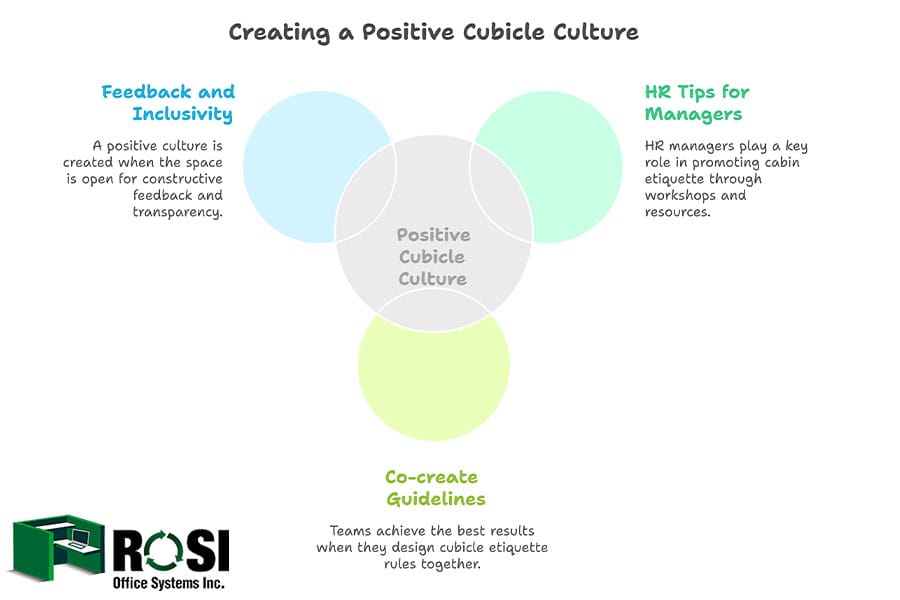
You Might Also Enjoy: What Are Office Cubicles Made of in 2026?
Cubicle etiquette is not just a set of individual rules, but part of the organizational culture that must be shaped by managers, teams, and the employees themselves.
Creating a healthy and positive work environment directly impacts productivity, team morale, and job satisfaction.
- HR Tips for Managers: Human resource managers and supervisors play a key role in promoting cabin etiquette.
They can introduce the basic principles of cabin etiquette to employees by holding short workshops and training sessions.
They can also provide employees with tools and resources, such as checklists or educational posters.
- Co-create Guidelines: The best results are achieved when teams design cubicle etiquette rules and principles together.
When employees are involved in the decision-making process, they feel more responsible for following the rules.
- Feedback and Inclusivity: A positive culture in the cubicle is created when the space is open for constructive feedback and transparency.
Employees should be able to raise their concerns without fear.
Also, laws should be designed to take into account the different needs of individuals.
Conclusion
Office cubicle etiquette principles are actually a tool for building mutual respect, increasing focus and productivity, and fostering teamwork in modern workplaces.
Cubicle etiquette isn’t rocket science—it’s just about being thoughtful.
By keeping these tips in mind, you can make your office a more enjoyable place for yourself and everyone around you. Who knows?
You might even inspire your coworkers to follow your lead.
In 2026, when offices are moving more towards open, shared, and hybrid spaces than ever before, paying attention to these details can make a significant difference in the quality of work and relationships between colleagues.
Although each individual is responsible for their own behavior, when all employees and managers are committed to adhering to these principles, the result will be a positive and professional work culture; a culture in which everyone feels valued, respected, and at ease.
Observing office etiquette, along with choosing the best office furniture, creates a calm, professional, and efficient environment for all employees.

John Ofield is a recognized expert in the office furniture and office cubicle industry in Houston, TX, with over 40 years of experience. As the founder of ROSI Office Systems, he specializes in furniture space planning, custom cubicle designs, modern office chairs and tables, and high-quality commercial furniture. John’s expertise helps businesses enhance productivity and collaboration. He is also dedicated to mentoring entrepreneurs and redefining workspaces to inspire success.